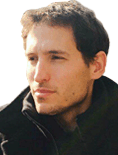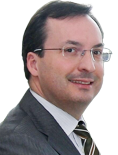
- Home

- Why
Changzhou 
- Industrial
Clusters 
- Investment
Platforms 
- Investment
Services 
- Guide to
ForeignersGuide to Foreigners—Living in Changzhou

- Resources
Download
Simone Rancan

Managing Director of Rieter (China) Textile Instrument Co. Ltd.
CIIP: Good morning Mr. Ramcan. Nice to meet you and thank you for accepting my interview. First, would you please give our audience a brief introduction of yourself and your company?
Simone R.: Firstly, I’m Italian, and I have worked in the textile machinery manufacturing industry more than 15 years since I graduated from Swiss Federal Institute of Technology in Zurich (ETHZ). Now I stay in Shanghai and I like my job now.
For our company, Rieter, it is the world's leading supplier of systems for short-staple fibre spinning. Based in Winterthur (Switzerland), we develop and manufactures machinery, systems and components used to convert natural and manmade fibers and their blends into yarns. Rieter is the only supplier worldwide to cover spinning preparation processes as well as all four final spinning processes currently established on the market. With 18 manufacturing locations in nine countries, we employs a global workforce of some 5 000, of which close to 20% are based in China.
And it has been almost 90 years since the first Rieter machine came to China in 1927. As you see, we’ve achieved a lot in China market and will keep our commitment to China market as we always do in the future. Such as we established the Application and Research Centre for Textile Technology in 2015, which is the unique in the world and we established a new service center in Urumqi in Xinjiang this year.
1. According to your background, you have worked in many different countries in the textile machines industry. Is your first experience working in China? What do you find different in China compared to these other countries?
Simone R.: No, this is not the first time. Actually I came to China for a project first time in 2004 and then worked and stayed in China since 2009. For me, what’s the most
interesting thing working in China is the so fast development in the past years, which really brings me much surprise.
2. May we know some of the challenges you may face personally and professionally as you work in Rieter (China) Textile Instrument Co. Ltd.?
Simone R.: I would say it’s more like opportunity, not challenges. I should know how to coordinate and live with the local people. As you know, the mode of thinking is different, so it’s kind of interesting to get used to how people here think about things. And professionally, it’s important to be ready to react to the fluctuating Chinese market, which is always in up and down.
3. Managing a foreign company requires a lot of cooperation with the Changzhou government offices. Can you describe the easiest and the most challenging areas you have found so far? Are there any improvements that could be made to create a better “win-win”environment?
Simone R.: So far I could only say it goes very well in cooperating with the Changzhou Government. Because you know we always follow the policy and laws. Based
on this point, the Government could provide us great support we need. So we already create “win-win” environment, and we’ll keep what we’re doing now to strengthen the good relationship.
4. As business leaders would know, Changzhou has focused on consistently developing 10 industrial chains such as rail transportation, automotive, agricultural and engineering machinery, solar and photovoltaic energy to name a few. With the mounting downward economic pressure what particular measures has your company taken to maintain growth?
Simone R.: This is a good question. For our company, we produce automatic machines with high energy efficiency, so that we could enjoy all the customers who would like to invest in the future by choosing machines with high automation level and also could save more energy. Then for our customers, they get the opportunity to manufacture products with higher quality and earn more profits. That’s how we survive and keep growing in the various market environments.
5. What are some of your favorite “free time”activities?
Simone R.: Oh, you know, I live in Shanghai now, meaning I spend around three hours going back and forth between Shanghai and Changzhou every day, plus the daily work. So free time for me is really limited. But I do catch every chance to taste different flavors of food, including many kinds of Chinese food, even some spicy ones; Definitely, I like reading very much, normally one to two books in one week, so my wife keeps complaining that our house is full of books; And I play piano also, which could let me feel so calm and relaxed after one day’s work.
6. May we know your personal impression about the city of Changzhou? What would be some of your suggestions as to how to improve the city of Changzhou, especially for those foreigners who want to stay here permanently?
Simone R.: I love Changzhou, it’s a great city, clean, safe and also have various entertainment venues, such as quiet bar for people to chat, and also some large amusement park for children, like Dinosaur Park. The location of Changzhou is also good, one hour to Shanghai and two hours to Beijing by plane.
For foreigners, it’s also a good choice to stay permanently. Especially it has several international schools which does great help for the children and also hospitals which are convenient for us too.
7. May we know if you came with a family? And do you have children? (You can answer if you wish.)
Simone R.: Yes, I stayed in Shanghai with my family and I have two children. I have a happy family and I love my family very much.
Thank you so much for your time, Mr. Rancan. Wish you have a good stay in Changzhou!
Add: 7th Floor,China MSA Building,NO.2 Wenyuan Road,Xinbei District,Changzhou 213002 China Tel:+86-(0)519-86185872 E-mail:ciip-contact@changzhou.gov.cn


